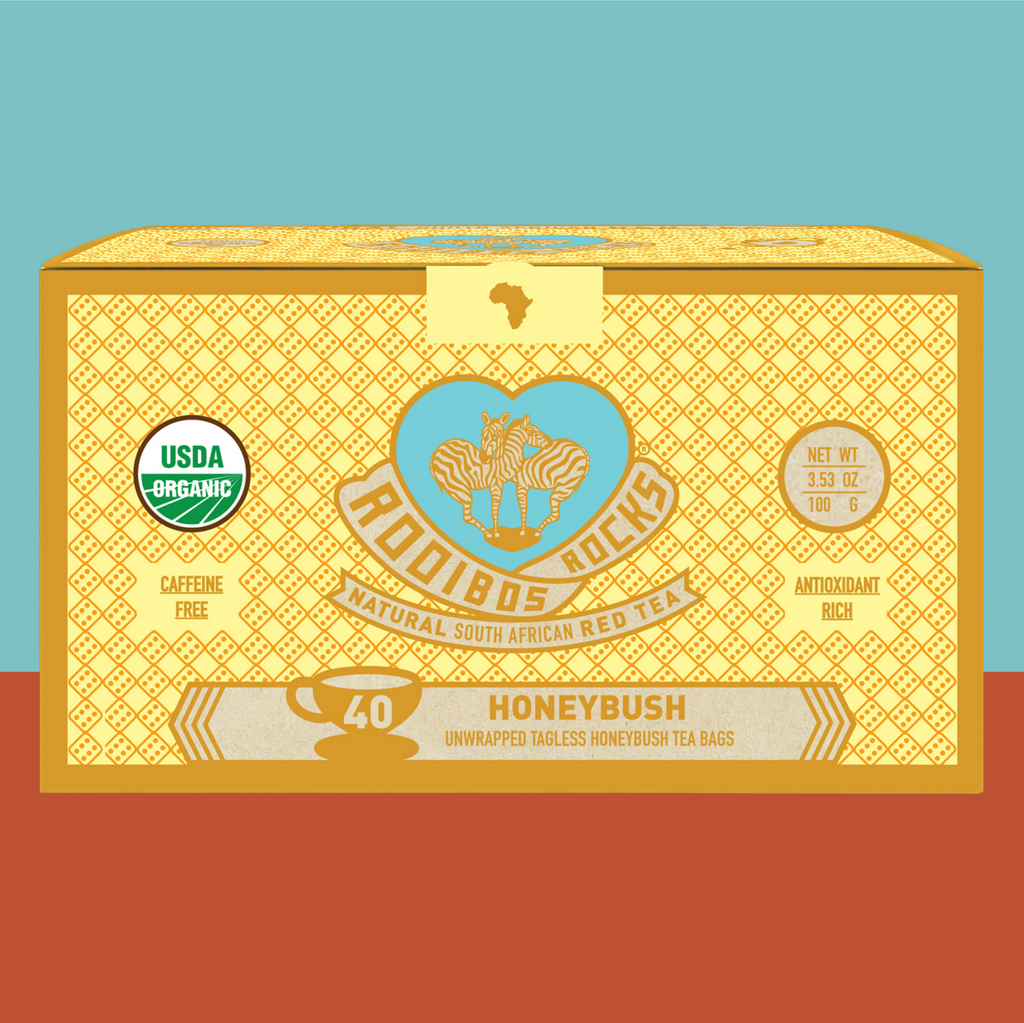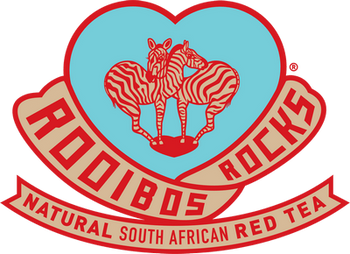









40 Organic Rooibos Rocks Honeybush Teabags
"THE CALMING EFFECTS OF THIS TEA ARE SECOND TO NONE. I DRINK IT THROUGHOUT THE DAY AND AT NIGHT BEFORE BED! SO SOOO DELICIOUS!!!" Buffy Paveloff
A close cousin to Rooibos, Honeybush Tea takes its name from its honey scented yellow flowers. It is soothing and naturally sweet with a fragrant floral finish. It tastes as good as it sounds.
Sip back and relax knowing our Honeybush Tea is USDA organic, sugar free and calorie free and the perfect caffeine-free alternative to coffee, black and green tea.
Your Price:
(Plus $9.95 for standard shipping. FREE standard shipping for orders over $35)
100% NO-RISK 30 DAY MONEY BACK GUARANTEE
"THE CALMING EFFECTS OF THIS TEA ARE SECOND TO NONE. I DRINK IT THROUGHOUT THE DAY AND AT NIGHT BEFORE BED! SO SOOO DELICIOUS!!!" Buffy Paveloff
A close cousin to Rooibos, Honeybush Tea takes its name from its honey scented yellow flowers. It is soothing and naturally sweet with a fragrant floral finish. It tastes as good as it sounds.
Sip back and relax knowing our Honeybush Tea is USDA organic, sugar free and calorie free and the perfect caffeine-free alternative to coffee, black and green tea.
Worried About Pesticides And GMOs?
Rooibos and Honeybush is certified USDA Organic – so you can buy with complete confidence that it meets their high organic standards and doesn’t contain any GMOs, antibiotics, herbicides or toxic chemicals.
The Cuppa With A Conscience!
Rooibos & Honeybush are sustainable and ethically farmed; supporting the local farming communities and helping to provide housing and schooling for their families.
Busy and Stressed?
Rooibos and Honeybush reduces production of the stress hormone Cortisol and being caffeine-free it won’t rev up your system. It’s the ultimate chill out cuppa!
Where Honeybush comes from
Honeybush is often described as a cousin to Rooibos. Similarities include the fact that neither grow anywhere else in the World and both are caffeine-free.
Also a ‘wonder herb’, Honeybush grows only in the mountains north of South Africa's Cape of Good Hope and along the coast from Plettenberg Bay in the Western Cape to Port Elizabeth in the Eastern Cape.
The use of Honeybush Tea (or Honigtee) was first documented in 1705. It has become a hugely popular herbal drink because of its sweet flavor and, like Rooibos, it is praised for its health benefits.
You might also like
SLEEP SOUNDLY
In a world of crazy there’s plenty to keep you awake at night. But with zero caffeine and traces of magnesium (known as "Nature’s Tranquilizer”). Rooibos Rocks calms your system to sleep easzzzzzzzzzy…
POWERFUL ANTIOXIDANTS
Rooibos is rich in antioxidants that may help prevent damage caused by excess free radicals in the body and guard you against health issues by boosting your immunity.
It’s a delicious way to safeguard your wellbeing.
What people say about us
Balanced honeybush flavor
★ ★ ★ ★ ★
“I’ve been looking for a good Honeybush tea, since it’s one of my favorite “anytime” teas. This one hit the spot! I love the regular honeybush flavor, it was just what I was hoping for. Mild and smooth, but not bland and Organic to boot!
—Kayleen Jasperse, Washington
The best tea l ever had!
★ ★ ★ ★ ★
“I drink several kinds of tea daily. I buy only the highest quality teas and brew with pristine water. This honeybush tea is the best of the best! Just had it hot and it was the most enjoyable cuppa l have ever had. Great to know it is sugar free!”
—Eva B, Little Rock
FAQ
-
What is Honeybush Tea?
Honeybush tea comes from the Cyclopia intermedia bush. Its vibrant yellow flowers give off a sweet smell of honey, hence the name.
-
Is Honeybush Tea the same as Rooibos Tea?
The plant is similar to Rooibos and comes from the same basic family. The leaves are collected and processed in the same way as Rooibos and once oxidised looks just alike. It does, however, taste slightly sweeter than its cousin. Other than that it has many of the same properties as Rooibos, including the fact it is caffeine-free and sugar free.
-
What color is Honeybush Tea when it is brewed?
Honeybush is the same warm reddish brown color as Rooibos.
-
Where does Honeybush Tea come from?
Like Rooibos, Honeybush is a rare plant that is unique to a very specific region in South Africa – but one that is slightly different from its red bush cousin. Honeybush grows wild in the coastal districts of the Western and Eastern Cape Provinces, from Darling to Port Elizabeth. It is formally farmed in very few areas, the most prolific of those being in the mountains north of the Cape of Good Hope.
-
How long has Honeybush Tea been around?
Longer than anyone can remember. The use of Honeybush tea was first documented in 1705. In 1772 a Swedish botanist recorded that he found “honigtee” during one of his field trips in the Cape region. The earliest record of Cape colonists using it as a medicinal plant dates back to 1830.
-
Is Honeybush Tea a pure and natural product?
Yes, totally. It contains no colourants, additives or preservatives.
-
Does Honeybush Tea have calories or kilojoules?
No. Despite its naturally sweet taste it’s totally sugar free and has no calories or kilojoules.
-
What is the best way to brew Honeybush Tea?
It rather depends on your own personal preference. The standard method is to steep your Honeybush teabag in boiling water for 4-5 minutes. Leave it in the water for longer to create a stronger and more flavorful beverage. It is much lower in tannins that regular tea so a longer brewing will not produce any bitter aftertaste.
-
What does "Organic" Honeybush mean?
Organic honeybush is grown without the use of any artificial fertilisers or pesticides. The organic status of the product is monitored by various international organizations that provide organic certification.
-
Can I resteep Honeybush?
Yes, you can drink a cuppa and then add more water to the teabag (which you’ve left in your cup or pot) or put your strained leaves back into the pot then top it up with more boiling water. You can do this two or three times – it’s a cuppa that keeps on giving!
-
Do I need to add anything to my Honeybush?
This is a matter of personal taste. Rooibos is naturally sweet so you don’t need to add sugar. But some people do prefer to add sugar or maybe honey. Again, adding milk is a matter of personal preference.
-
Can I drink Honeybush as iced tea?
Yes, just brew as normal and then chill it. Or cold brew it (see below).
-
What is cold brewed Honeybush?
You just steep some Honeybush tea bags in a pitcher of cold water for about 12 hours in a refrigerator then enjoy as delicious iced Honeybush.
-
What is sun brewed Honeybush? (sun tea)
Same process as cold brewed but you leave the pitcher in the sun for a couple of hours, then chill or serve with ice.
-
What is Honeybush latte?
Basically it is Honeybush served with hot milk – a great bedtime treat as it’s caffeine-free. There are different variations you can try but basically you brew a couple of Honeybush teabags in a small cup of water that’s just boiled. Let it steep until you have a strong concentrate.
You might (according to taste) add sugar, honey or maple syrup. Maybe add some cinnamon or vanilla essence. Add hot milk (you can froth it if you like) to your tea concentrate using a 1:1 ratio to ensure that the tea flavor stays strong.
-
Can I mix Honeybush with alcohol to make cocktails?
Yes, yes, yes! You’ll find some very tempting Rocktail ideas if you visit our blog – just substitute Honeybush for Rooibos.
-
Can I use Honeybush in my cooking?
Absolutely. It adds an extra depth of flavor to a wide variety of recipes from roasts to cakes and desserts to bread. Check out our blog for recipes that rock – just substitute Honeybush for Rooibos.
-
Is Honeybush suitable for smoothies?
You bet! Just use your imagination or whet your appetite with the smoothie ideas on our blog – just substitute Honeybush for Rooibos.
-
How does Honeybush support local communities?
Honeybush provides income and employment for the indigenous people who work on the farms in coastal districts of the Western and Eastern Cape Provinces. Most of these farms also provide housing and schooling for the local people.
-
How does Rooibos and Honeybush support local communities?
Rooibos and Honeybush is sustainably and ethically farmed, supporting the local communities in the area it is grown and helps to provide housing and schooling for the local farming families.
-
What does “organic” Honeybush mean?
Organic Honeybush is grown without the use of any artificial fertilisers or pesticides. The organic status of the product is monitored by various international organizations that provide organic certification. Rooibos Rocks is certified organic and non-GMO by the US Department of Agriculture.
















